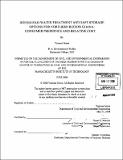Household water treatment and safe storage options for Northern Region Ghana : consumer preference and relative cost
Author(s)
Green, Vanessa (Vanessa Layton)
DownloadFull printable version (50.56Mb)
Alternative title
HWTS storage options for Northern Region Ghana : consumer preference and relative cost
Other Contributors
Massachusetts Institute of Technology. Dept. of Civil and Environmental Engineering.
Advisor
Susan E. Murcott.
Terms of use
Metadata
Show full item recordAbstract
A range of household water treatment and safe storage (HWTS) products are available in Northern Region Ghana which have the potential to significantly improve local drinking water quality. However, to date, the region has failed to see significant HWTS product adoption and sustained use. Therefore, this consumer preference study was conducted to give HWTS implementing organizations a method and tool to help stimulate product uptake by tailoring water quality interventions to local preferences and needs. Ultimately, this work highlights a discrete set of HWTS products most likely to have the greatest impact on local drinking water quality, based on product effectiveness, adoption and sustained use. The research methodology included a consumer preference survey and water quality testing in 237 households in four rural and three urban communities around Tamale, Ghana in January 2008. Turbidity testing and total coliforms (TC) and Escherichia coli (E.coli) removal were used to assess source water quality. The research confirmed that local purchasing decisions are dominated by a desire for products that offer a major health improvement and have a traditional durable product look, with relatively less importance placed on water taste and look, treatment time and price. The data was used to generate baseline consumer profiles based on a combination of demographic characteristics, source water quality, HWTS product preferences, ability to pay, and purchasing behavior. The consumer profiles reveal that a traditional durable product such as Pure Home Water's Kosim ceramic pot filter is a good fit for communities with turbid source water; however, a portfolio HWTS approach will be required to meet the diverse needs of the northern Ghana population. (cont.) Specifically, there is a cross-segment need for a safe storage product as well as a low-cost chlorine disinfection option. There is an opportunity for revenue generation through a sachet water business targeted to the high-income segment of the urban market. Finally, continued investment in filtration and flocculation technology options will be required to effectively serve rural communities that utilize surfaces waters with average turbidities >200 NTU.
Description
Thesis (M. Eng.)--Massachusetts Institute of Technology, Dept. of Civil and Environmental Engineering, 2008. Includes bibliographical references (p. 69-72).
Date issued
2008Department
Massachusetts Institute of Technology. Department of Civil and Environmental EngineeringPublisher
Massachusetts Institute of Technology
Keywords
Civil and Environmental Engineering.